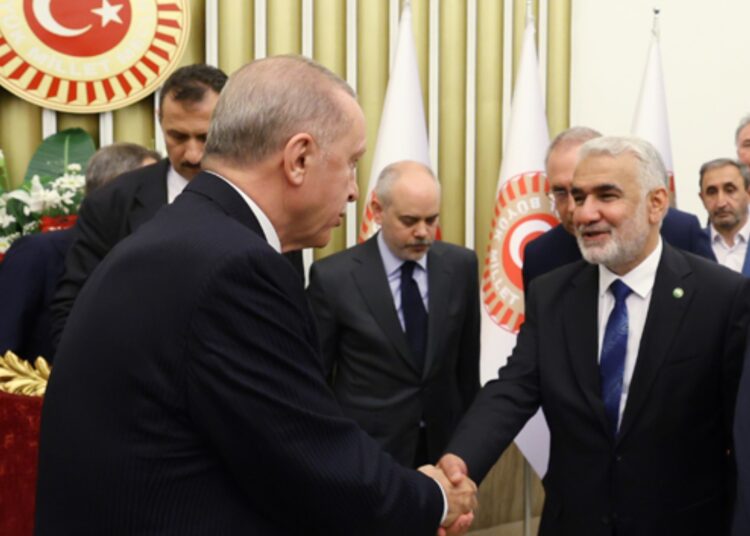Abdullah Bozkurt/Stockholm
An anti-Israel faction, spearheaded by Turkey’s pro-Iran Hizbullah group and endorsed by President Recep Tayyip Erdogan’s governing party, has made significant strides in advancing a bill that would permit the revocation of Turkish citizenship for dual Israeli nationals, the confiscation of their assets and their criminal prosecution.
The move is feared to trigger a new wave of antisemitic campaigns against Jews in Turkey, already under pressure regardless of whether they hold Israeli citizenship or are accused of involvement in alleged human rights violations in the Hamas-Israel conflict.
The bill was first proposed by HÜDA-PAR, the political arm of Turkey’s Hizbullah and a fundamentalist party officially allied with the ruling Justice and Development Party (AKP), on December 28, 2023. It was referred to four separate committees for debate, with the Justice Committee designated as the primary venue for its review.
No bill has a chance of clearing any committee in the Turkish parliament unless it is endorsed and advanced by Erdogan’s party, which dominates both the General Assembly and the committees. Many assumed this bill would be no different and would not be taken up on the agenda.
However, something very unusual happened in the Turkish parliament on May 7, signaling that this situation was quite different. Four Hizbullah lawmakers —Zekeriya Yapıcıoğlu, Şahzade Demir, Serkan Ramanlı and Faruk Dinç — who managed to enter parliament for the first time by running on Erdogan’s party ticket in last year’s elections, submitted a motion asking the assembly to consider the bill directly, bypassing any review and debate in the committees.
Text of the draft Turkish bill that would permit the revocation of Turkish citizenship for dual Israeli nationals, the confiscation of their assets and their criminal prosecution:
Under parliamentary bylaws, political parties can submit motions to have their proposed bills reviewed by the assembly if no action is taken in the committees after 45 days. This provision is rarely utilized, as the likelihood of a bill clearing the assembly without the endorsement of the majority-vote-holding governing party is virtually nonexistent.
On May 9 Hizbullah’s motion was unexpectedly approved by the General Assembly with an overwhelming majority. This support came not only from Erdogan’s AKP and his far-right ally, the Nationalist Movement Party (MHP), but also from smaller opposition Islamist and nationalist parties, including İYİ (Good), Saadet (Felicity), Gelecek (Future), Deva (Democracy and Progress) and Yeniden Refah (New Welfare).
The main opposition Republican People’s Party (CHP) opposed the bill for its own reasons, arguing that the government does not need a new law to prosecute and punish Jews who commit crimes in Palestinian territories. “If individuals from Turkey are going to Gaza with Turkish passports and committing crimes against humanity, action should have already been taken,” said Murat Emir, a CHP lawmaker.
On the surface the six-article bill appears to target Turkish-Israeli dual nationals who volunteer to enlist in the Israeli army and perpetrate human rights abuses. However, in reality, Hizbullah and its allies aim to crack down on Jews and their supporters in Turkey. If the bill is enacted, the prosecution and trial of Turkish-Israeli dual nationals would become possible if the parliament adopts a resolution to that effect. In other words politicians would determine whether criminal prosecution against Jews is warranted. Currently, such prosecution and trial can only occur with permission from the Justice Ministry.
The bill would also mandate the revocation of Turkish citizenship for such individuals, thereby removing the government’s prerogative to review and assess the implications. Additionally, the assets of these individuals would be confiscated and transferred to a fund described as the Family and Youth Fund.
Hizbullah has initiated a nationwide campaign to pressure political parties represented in parliament to pass the bill before the summer recess. So far, the campaign has enlisted the support of influential figures within the government.

For example, a panel discussion organized around the draft bill was held in Ankara on July 13 by the Ankara Social Sciences University (ASBÜ). The event featured Şeref Malkoç, Turkey’s chief ombudsman, whose son-in-law Abdulhamit Gül is the leader of the AKP’s parliamentary group and a former justice minister. Also speaking at the event was Muhammet Ecevit Carti, a member of Turkey’s National Human Rights and Equality Commission (Türkiye İnsan Hakları ve Eşitlik Kurulu). Both represented the government views on how to proceed.
The event received extensive coverage, with the state-run Anadolu news agency reporting on it.
The remarks made by Musa Kazım Arıcan, the rector of ASBÜ and host of the event, revealed the true intentions of the bill’s proponents. In his opening speech he stated, “I believe that, God willing, the activities conducted here might eventually lead to the destruction of Israel.” He further claimed that Hamas’s resistance had shattered Israel’s myth.
Echoing similar sentiments, Chief Ombudsman Malkoç said he views the issue of Turkish Jews enlisting in the Israeli army not only as a legal matter but also as a national security concern. He emphasized that Turkey must extend its scrutiny beyond military affairs to critical industries such as defense, healthcare and information technology to identify potential threats. “Their [Jews’] connections with Turkey, especially in critical sectors from defense to healthcare, and particularly in software, are also related to Turkey’s national security,” he warned.

He added that he was pleased to see that the decades-long campaign by Islamists against Jews and Zionists, which was previously dismissed as a hoax or conspiracy, has now become a formal policy of the Turkish state, publicly endorsed by the highest levels of Turkish leadership. “This is extraordinary, my friends,” he said.
One of the conspiracies Malkoç was referring to involved the claim that Israel aims to annex large parts of Turkey’s southeast as part of a “Greater Israel” project. This notion has been publicly endorsed by Turkish President Erdogan in recent months.
It is clear that the bill poses the risk of targeting not only the entire Jewish community in Turkey but also dual nationals living outside the country. There are already significant signs that Hizbullah and its allies are intent on escalating the situation further. In fact, the declaration adopted at the end of the panel discussion suggests a witch-hunt against anyone deemed to support Turkish-Israeli dual nationals, including those who provide logistics, healthcare or rehabilitation services to individuals who have served in the Israeli military.
At the same panel discussion, Yılmaz Bilgen, a radical Islamist figure spearheading the campaign, presented inflated figures and extravagant claims. He asserted that 4,000 dual Turkish-Israeli nationals are responsible for shedding Palestinian blood in Gaza. Additionally, he alleged that many Jews with Turkish citizenship use third countries in Europe and Africa to evade detection. Bilgen claimed to have obtained this information from government sources, although he did not specify what those sources were.

Bilgen initially raised these unsubstantiated claims in a headline story that he wrote for the pro-government Türkiye daily on June 26. The article suggested that as many as 10,000 Turkish Jews are serving in the Israeli army as conscripts, volunteers, reservists and logistical support. Given that an estimated 10,000 Jews live in Turkey, it is obvious that Bilgen’s figures are greatly exaggerated and lack credibility. However, they serve to incite antisemitic sentiment in Turkey in the context of the Hamas-Israel conflict.
Bilgen’s track record sheds light on why he was selected as the spokesperson for this campaign in Turkey. A confidential intelligence file about him, a copy of which was obtained by Nordic Monitor, reveals that he is a member of the jihadist terror group Vasat. This group is listed as a terrorist entity in Turkey due to its involvement in bombing a Bible publishing house and killing an innocent boy in the past.
The file indicates that Bilgen uses the code name Yasir in the Vasat group and presents himself in private circles as a disciple of the group’s leader, Şahimerdan Sarı. He is reported to have three wives and four children.
Vasat was revitalized under President Erdogan, who facilitated the release of Vasat leader Sarı, an extremist cleric convicted twice on terrorism charges in June 2019. The Supreme Court of Appeals (Yargıtay), which had been staffed with Islamists and nationalists following a mass purge of the nation’s highest criminal court in 2016, ruled for Sarı’s acquittal. This decision was in clear contradiction to two prior rulings by the same court that had upheld Sarı’s convictions.
Turkish intelligence note about Yılmaz Bilgen reveals his ties to terrorist groups including one backed by the Quds Force (Redactions were applied by Nordic Monitor to remove private data):
According to police records, some members of Vasat later joined the Islamic State in Syria (ISIS). Notably, two ISIS suicide bombers involved in a deadly terrorist attack on October 10, 2015 near the Ankara train station, which resulted in the death of 109 people, had previously been associated with the Vasat group.
The intelligence file also indicates that Bilgen has close ties to individuals associated with the illegal Tevhid Selam organization, which is a Turkish affiliate of the Iranian-based Quds Force.
Supporters of the campaign argue that even if the bill fails, existing legislation is sufficient to prosecute Jews and revoke their Turkish citizenship.
According to Article 320 of the Turkish Penal Code (TCK), enlisting in a foreign army without permission from Turkish authorities is a punishable offense, carrying a penalty of up to three years in prison. Those who coordinate such recruitment face longer sentences. Until June 2019 Turkey had waived the obligation for dual Turkish-Israeli nationals to serve in the Turkish military if they had previously completed conscription in the Israeli military. This waiver, originally granted by a cabinet decision in July 1993, is no longer in effect.
In the wake of the recent Israeli-Hamas conflict, a perfect storm against Jews appears to have been created in Turkey, with support from the government, its allies, opposition parties and various Islamist, nationalist and neo-nationalist groups. It is evident that Iranian clandestine services are exploiting the conflict to escalate the campaign further, using their proxies in Turkey, including Hizbullah, to lead the charge.
Given Turkey’s history of targeting Greek and Armenian minorities through campaigns of confiscation, exile and asset seizure as well as recent similar practices against members of the government-critical Gülen movement, there is ample reason to be deeply concerned about the current campaign against Jews holding Turkish passports.
The goal does not seem to be limited to addressing alleged human rights abuses in the Israeli-Hamas conflict but rather to impose collective punishment on the Jewish minority and their supporters.












